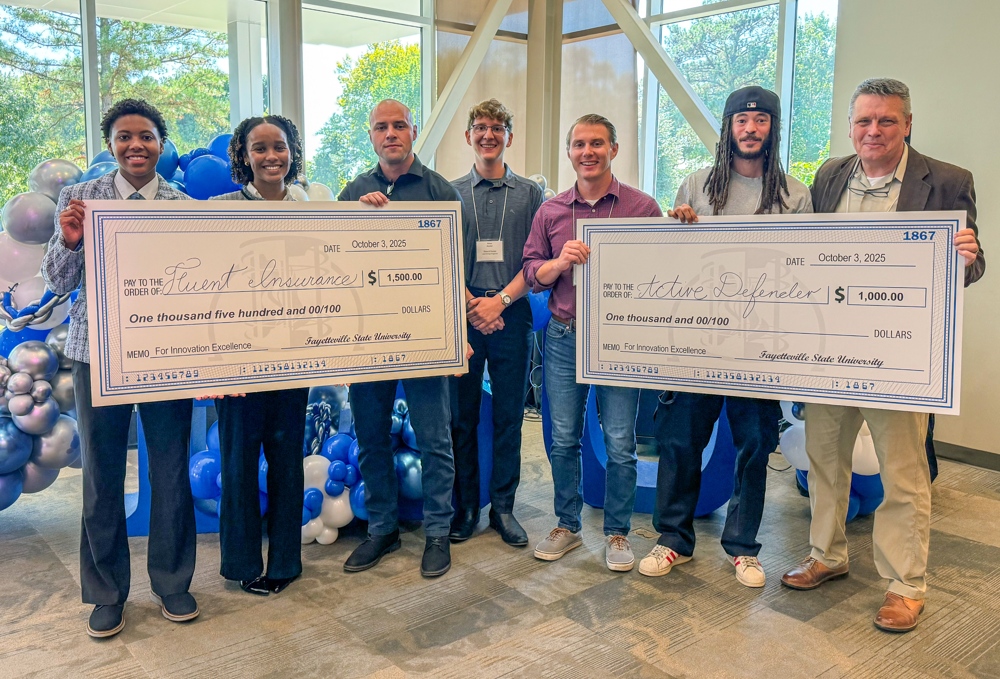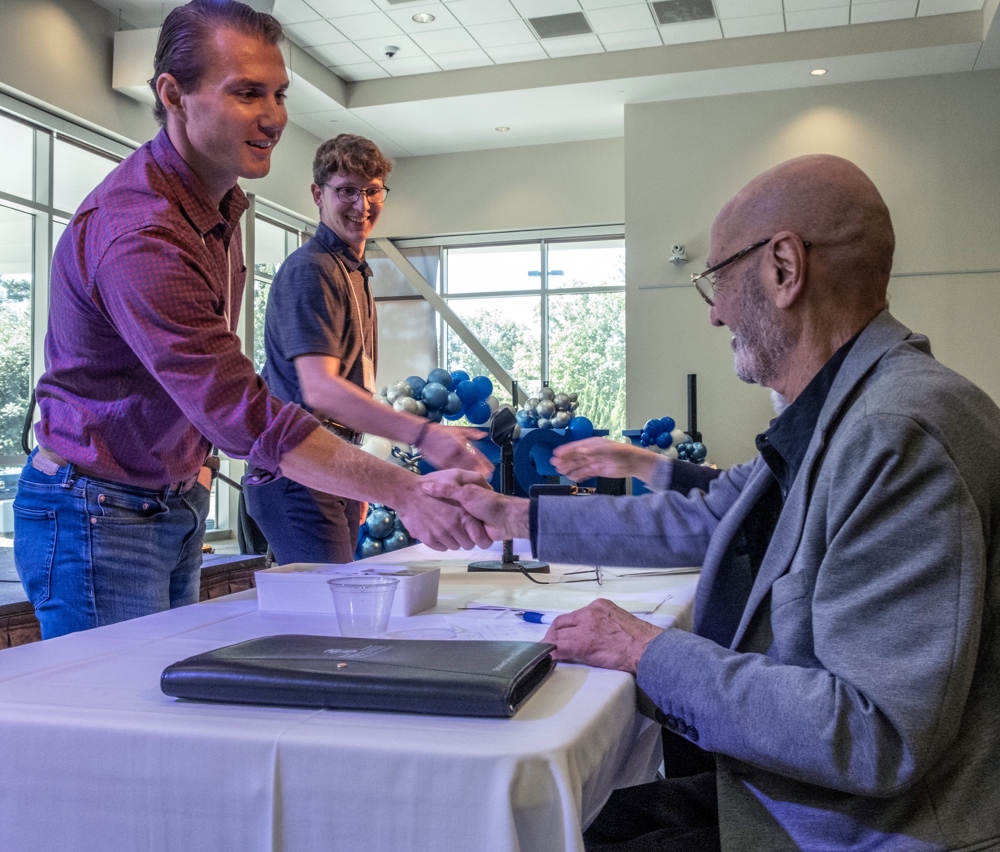Fayetteville State Wants to Be the Engine of North Carolina’s Next Big Idea
At a small but ambitious forum, FSU brought together entrepreneurs, defense leaders, and investors to prove that innovation isn’t about scale. It’s about collaboration, timing, and the courage to build something new in the state’s most unexpected corner
 Pitch competition participants at Fayetteville State University’s Innovation Pathways & Partnerships forum pose with the award checks on Oct. 3 at the Rudolph Jones Student Center. From left, Aria Freeman, Meshai Ives Maissonet, Francisco Portillo, Ethan Kessler, Tyler Renken, Austin Kinlaw, and Jim Boyte. Freeman and Maissonet took first place in the competition, earning a $1,500 prize for their innovative pitch. Boyte followed closely with a second-place finish and a $1,000 award for his concept. (Photo courtesy of Tyler Renken)
Pitch competition participants at Fayetteville State University’s Innovation Pathways & Partnerships forum pose with the award checks on Oct. 3 at the Rudolph Jones Student Center. From left, Aria Freeman, Meshai Ives Maissonet, Francisco Portillo, Ethan Kessler, Tyler Renken, Austin Kinlaw, and Jim Boyte. Freeman and Maissonet took first place in the competition, earning a $1,500 prize for their innovative pitch. Boyte followed closely with a second-place finish and a $1,000 award for his concept. (Photo courtesy of Tyler Renken) FAYETTEVILLE, N.C. – A handful of notebooks lay open across the tables at Fayetteville State University’s Rudolph Jones Student Center on Oct. 3. The faces behind them, students, veterans, and first-time founders, listened with quiet intensity as speakers described how to turn a concept into a company.
No flashy slides. No startup theatrics. Just sharp minds, steady curiosity, and the shared belief that even in a mid-sized city like Fayetteville, the next breakthrough could start here.
Fayetteville State’s second Innovation Pathways & Partnerships forum was designed to help innovators transition from concept to commercialization by facilitating connections among entrepreneurs, defense experts, investors, and university researchers. Co-sponsored by NCInnovation, the Broadwell Gift Fund Endowment at FSU’s Broadwell College of Business and Economics, and the Center for Enterprise Resource Planning and Advanced Analytics, the half-day event focused on turning ideas into real-world solutions.
“We have all this talent here at Fayetteville State University - people who are literally world-class in artificial intelligence, geospatial intelligence, and supply chain systems,” said Gregory McElveen, assistant vice chancellor for Strategic Initiatives and executive director of the FSU Research Corporation. “This event is about connecting that expertise with the community so innovators can bring their products to life.”
Aligning Ideas with Mission
When Kevin Grayson, assistant director of Technology Management at North Carolina State University’s Industry Expansion Solutions, took the stage, the room grew silent. He introduced his university’s “Yellow Card” framework, a simple yet powerful method for testing whether an idea actually solves a problem.
“Innovation isn’t invention,” Grayson explained. “It’s iteration, finding the version that meets a market need.”
The message resonated across the room. Pens moved fast as participants translated lessons into notes. For many, the insight was less about technology and more about process. Innovation can be taught. It can be practiced. And with the right structure, it can be repeated.
Then came retired Brig. Gen. Ferd Irizarry, who brought innovation back to the mission. Drawing from his Army Special Operations background, he outlined five priority areas driving the Department of Defense’s research and investment: artificial intelligence, biotechnology, advanced materials, drones and autonomous systems, and behavioral sciences.
“The Army’s focus on AI, biotech, and autonomous systems shows how academic partnerships can transform national capability,” said Irizarry. “What’s happening here is more than collaboration, it’s acceleration.”
In Fayetteville, a city defined by its proximity to Fort Bragg, that message carried weight. The line between university innovation and national readiness has never been closer.
The funding panel moved the conversation from ideas to action. Trill Paullin, Ph.D., chief science officer for Nova Vita Laboratories, served as the moderator. Joining her were Magali Rivera, business solutions officer at the Carolina Small Business Development Fund, and Chris Schmidt, grants manager at the North Carolina Department of Commerce’s Office of Science, Technology & Innovation.
Rivera described her organization’s approach as part banker and part mentor, offering loans up to $350,000 alongside technical assistance for startups finding their footing.
“There’s money out there,” said Rivera. “But readiness is the difference between applying and winning.”
Schmidt explained that the state’s One North Carolina Small Business Program gives local innovators a measurable advantage by matching federal Small Business Innovation Research and Small Business Technology Transfer grants. She emphasized that this collaborative approach is what distinguishes North Carolina. Progress, she noted, comes from partnership rather than isolation.
 Ethan Kessler and Tyler Renken, both students at Campbell University, shake hands with the judges before presenting their innovation, FitKit, at Fayetteville State University’s Innovation Pathways & Partnerships forum on Oct. 3. FitKit is a modular hand-therapy device designed to help occupational therapists and patients rebuild hand mobility. (Photo by FSU)
Ethan Kessler and Tyler Renken, both students at Campbell University, shake hands with the judges before presenting their innovation, FitKit, at Fayetteville State University’s Innovation Pathways & Partnerships forum on Oct. 3. FitKit is a modular hand-therapy device designed to help occupational therapists and patients rebuild hand mobility. (Photo by FSU)The final pre-pitch presentation featured First Flight Ventures, an incubator based in the Research Triangle Park that supports high-tech startups across the state. Balaji Vasudevan, Ph.D., the director of programs, shared that over the past 35 years, First Flight has helped more than 400 companies raise over $350 million and create 3,000 jobs in North Carolina.
Vasudevan spotlighted three of their flagship programs. Propeller is an accelerator that helps early-stage startups move from concept to investor readiness. Anchor 6 Labs is a prototyping facility equipped with advanced tools, including 3D printing, fabrication, and laser cutting. Wingspan assists international companies as they enter the U.S. market.
"Their success is our success, and it is also North Carolina’s success," Vasudevan said, closing the session on a note of shared achievement.
The morning of inspiration had ended. Now, it was time for bold ideas to take center stage.
Ideas in Motion
Seven teams presented their ideas before a panel of judges, each offering a glimpse of North Carolina’s growing innovation network.
Fluent Insurance claimed first place, led by Aria Freeman, an FSU junior double majoring in accounting and banking and finance. Freeman developed an AI-powered renters' insurance platform tailored for Gen Z. She was joined on stage by Meshai Ives Maissonet, a fellow junior majoring in business, as they introduced Bo, a chatbot designed to simplify complex insurance jargon into a five-minute conversation. For their innovative approach, the team took home the $1,500 top prize.
“A lot of students don’t even know they need renters insurance until something goes wrong,” said Freeman. “Our goal is to make it simple, fast, and accessible. To turn insurance into something students can actually understand.”
Active Defender earned second place with a pitch from CEO Jim Boyte. The company’s AI-powered platform analyzes speech patterns to spot early signs of agitation or aggression, aiming to prevent violence before it happens. This proactive safety solution is already being piloted in schools, hospitals, and other public spaces. For his innovative work, Boyte took home the $1,000 runner-up prize.
Other teams showcased a range of ideas emerging across the region:
- Ethan Kessler and Tyler Renken, both students at Campbell University, earned strong praise for their FitKit, a modular hand-therapy device designed to help occupational therapists and patients rebuild mobility using real-world tools.
- Francisco Portillo with AFC Industries, presented PyroTech, a flame-retardant textile tested at NC State and used in NATO uniforms, which is resistant to temperatures of up to 1,800 degrees Fahrenheit without the use of the chemical perfluorooctane sulfonate (PFOS) or toxic fumes.
- Marianeth Crockett of Kaleo Group introduced Knexis, a nanotech wearable designed for missing-person recovery and defense operations.
- Austin Kinlaw, an FSU student, unveiled Caverna, a visual creativity platform that helps users “innovate their imagination” through design thinking and user experience tools.
- Derrice Hamlin, an FSU student, pitched Hamlin Houston Vending, which offers AI-assisted vending machines featuring healthy food options for industrial workplaces.
After the winners were announced, Alison Beatty, NCInnovation’s hub director for Fayetteville State University, unveiled a new Pipeline Development Fund, offering up to $25,000 for rapid prototyping and university-industry collaborations, adding that “every partnership formed here today has a chance to become something real.”
“We want to celebrate those prototypes at the next Innovation Pathways event and show how ideas from Fayetteville are shaping North Carolina’s innovation landscape,” she added.
Rob Patton, executive vice president of the Fayetteville Cumberland County Economic Development Corporation, ended the event with a rallying call. He urged the audience to imagine the next big thing emerging from their own backyard—conceived, built, and launched in Fayetteville, fueling the future for the entire region.
The next Innovation Pathways & Partnerships forum is set for Spring 2026, where organizers plan to showcase prototypes born from this fall’s collaboration.
Small as it may have been, the October gathering felt like the beginning of something larger. Organizers and participants alike left energized, ready to transform the day’s partnerships into real innovations. Fayetteville’s story as a hub for unexpected ideas is only beginning. The next breakthrough may come sooner than anyone expects.
